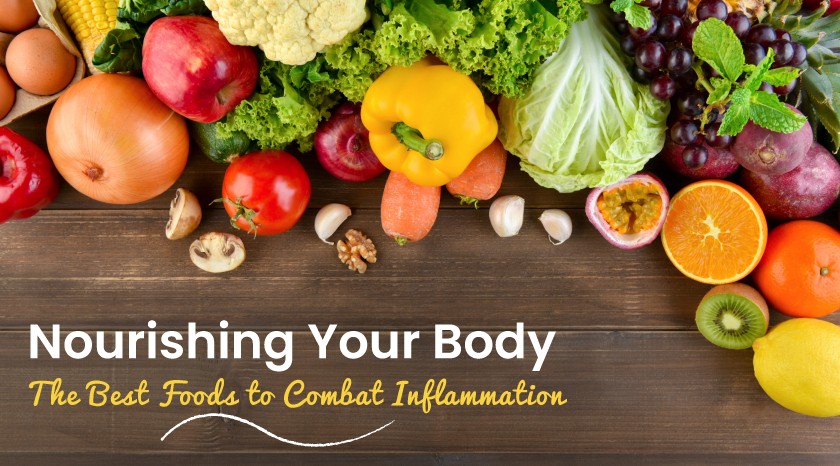Inflammation is a natural response by the body’s immune system to protect against injury, infection, and illness. However, when inflammation becomes chronic, it can contribute to various health conditions such as arthritis, heart disease, and autoimmune disorders. Fortunately, adopting an anti-inflammatory diet rich in nutrient-dense foods can help reduce inflammation and promote overall health and well-being. Let’s explore some of the best foods to include in your diet to combat inflammation and support optimal health.
1. Leafy Greens: Leafy greens such as spinach, kale, Swiss chard, and collard greens are packed with vitamins, minerals, and antioxidants that help combat inflammation. These greens are rich in vitamin K, which has anti-inflammatory properties, as well as phytonutrients like quercetin and lutein, which help reduce inflammation and oxidative stress in the body.
2. Fatty Fish: Fatty fish such as salmon, mackerel, sardines, and trout are excellent sources of omega-3 fatty acids, which have potent anti-inflammatory effects. Omega-3 fatty acids help reduce levels of inflammatory markers in the body and may lower the risk of chronic diseases such as heart disease, arthritis, and cancer.
3. Berries: Berries such as strawberries, blueberries, raspberries, and blackberries are rich in antioxidants called flavonoids, which have anti-inflammatory properties. These vibrant fruits help reduce inflammation and oxidative stress in the body, protecting against chronic diseases and promoting overall health.
4. Nuts and Seeds: Nuts and seeds such as almonds, walnuts, flaxseeds, and chia seeds are rich in healthy fats, fiber, and antioxidants that help combat inflammation. These nutrient-dense foods provide a source of alpha-linolenic acid (ALA) and other anti-inflammatory compounds that support heart health and reduce inflammation throughout the body.
5. Turmeric: Turmeric is a spice derived from the turmeric plant, known for its vibrant yellow color and potent anti-inflammatory properties. Curcumin, the active compound in turmeric, has been shown to inhibit inflammatory pathways in the body, making it a valuable addition to an anti-inflammatory diet. Incorporate turmeric into curries, soups, stir-fries, and smoothies for a flavorful boost of anti-inflammatory goodness.
6. Olive Oil: Extra virgin olive oil is a staple of the Mediterranean diet and is renowned for its anti-inflammatory properties. Rich in monounsaturated fats and antioxidants such as oleocanthal, olive oil helps reduce inflammation and protect against chronic diseases such as heart disease and diabetes. Use olive oil as a healthy cooking oil or drizzle it over salads and vegetables for added flavor and health benefits.
7. Whole Grains: Whole grains such as brown rice, quinoa, oats, and barley are rich in fiber, vitamins, minerals, and antioxidants that help combat inflammation. Unlike refined grains, which can contribute to inflammation, whole grains provide sustained energy and promote digestive health, making them an essential component of an anti-inflammatory diet.
8. Green Tea: Green tea is loaded with antioxidants called catechins, which have powerful anti-inflammatory effects. Drinking green tea regularly may help reduce inflammation, protect against chronic diseases, and promote overall health and well-being. Enjoy green tea as a refreshing beverage or incorporate it into smoothies, iced teas, and other recipes for added antioxidant benefits.
9. Dark Chocolate: Dark chocolate contains flavonoids called flavanols, which have anti-inflammatory and antioxidant properties. Consuming dark chocolate with a high cocoa content (70% or higher) may help reduce inflammation, improve heart health, and enhance mood and cognitive function. Enjoy dark chocolate in moderation as part of a balanced diet for maximum health benefits.
Incorporating nutrient-dense foods into your diet is a powerful way to combat inflammation and promote overall health and well-being. By focusing on whole, unprocessed foods rich in antioxidants, omega-3 fatty acids, and anti-inflammatory compounds, you can reduce inflammation, protect against chronic diseases, and support optimal health. Remember to prioritize variety, balance, and moderation in your diet, and consult with a healthcare provider or registered dietitian for personalized nutrition recommendations tailored to your specific health needs and goals. By nourishing your body with the best foods to combat inflammation, you can take proactive steps towards a healthier, happier life.




